Evidence Based Nursing Research: Effectiveness of MBCT for Veterans
VerifiedAdded on 2023/02/01
|26
|6308
|86
Report
AI Summary
This report presents an evidence-based nursing research proposal focusing on the effectiveness of mindfulness-based cognitive therapy (MBCT) in reducing depression and suicide ideation among military veterans. The introduction highlights the prevalence of mental disorders, particularly depression and PTSD, in this population and emphasizes the need for effective psychological interventions. The problem statement addresses the impact of military experiences on mental health, identifies risk factors, and establishes the rationale for the research. The research question, framed within a PICOT framework, investigates whether psychological intervention can reduce depressive symptoms and PTSD within one year. A comprehensive literature review explores existing psychological interventions, with a focus on MBCT, and its efficacy in treating PTSD and preventing suicidal behavior in veterans. The report analyzes pilot studies and clinical trials, highlighting the potential of MBCT while acknowledging methodological limitations. The proposal aims to contribute to the development of effective mental health interventions for military veterans, addressing a critical public health concern.
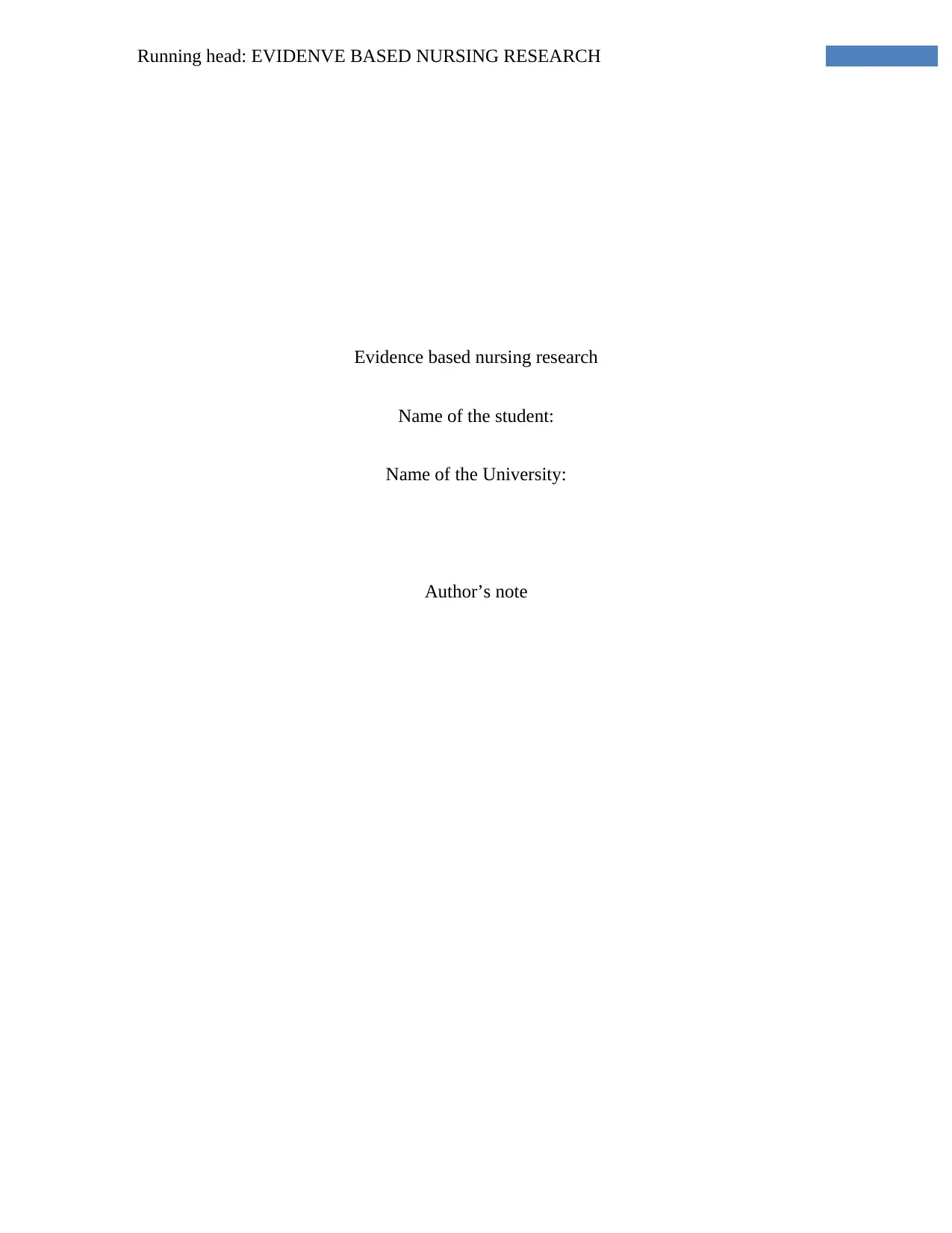
Running head: EVIDENVE BASED NURSING RESEARCH
Evidence based nursing research
Name of the student:
Name of the University:
Author’s note
Evidence based nursing research
Name of the student:
Name of the University:
Author’s note
Paraphrase This Document
Need a fresh take? Get an instant paraphrase of this document with our AI Paraphraser
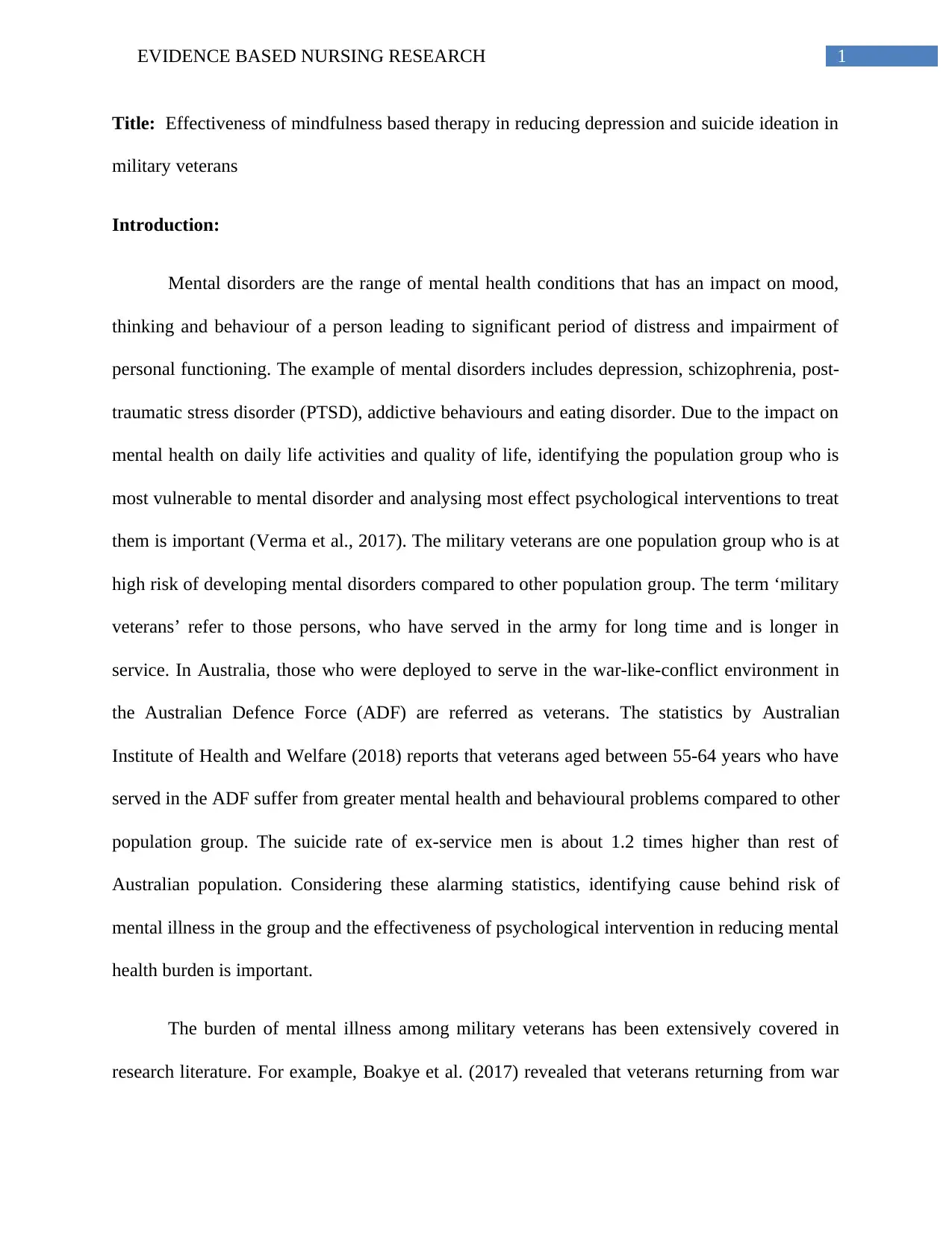
1EVIDENCE BASED NURSING RESEARCH
Title: Effectiveness of mindfulness based therapy in reducing depression and suicide ideation in
military veterans
Introduction:
Mental disorders are the range of mental health conditions that has an impact on mood,
thinking and behaviour of a person leading to significant period of distress and impairment of
personal functioning. The example of mental disorders includes depression, schizophrenia, post-
traumatic stress disorder (PTSD), addictive behaviours and eating disorder. Due to the impact on
mental health on daily life activities and quality of life, identifying the population group who is
most vulnerable to mental disorder and analysing most effect psychological interventions to treat
them is important (Verma et al., 2017). The military veterans are one population group who is at
high risk of developing mental disorders compared to other population group. The term ‘military
veterans’ refer to those persons, who have served in the army for long time and is longer in
service. In Australia, those who were deployed to serve in the war-like-conflict environment in
the Australian Defence Force (ADF) are referred as veterans. The statistics by Australian
Institute of Health and Welfare (2018) reports that veterans aged between 55-64 years who have
served in the ADF suffer from greater mental health and behavioural problems compared to other
population group. The suicide rate of ex-service men is about 1.2 times higher than rest of
Australian population. Considering these alarming statistics, identifying cause behind risk of
mental illness in the group and the effectiveness of psychological intervention in reducing mental
health burden is important.
The burden of mental illness among military veterans has been extensively covered in
research literature. For example, Boakye et al. (2017) revealed that veterans returning from war
Title: Effectiveness of mindfulness based therapy in reducing depression and suicide ideation in
military veterans
Introduction:
Mental disorders are the range of mental health conditions that has an impact on mood,
thinking and behaviour of a person leading to significant period of distress and impairment of
personal functioning. The example of mental disorders includes depression, schizophrenia, post-
traumatic stress disorder (PTSD), addictive behaviours and eating disorder. Due to the impact on
mental health on daily life activities and quality of life, identifying the population group who is
most vulnerable to mental disorder and analysing most effect psychological interventions to treat
them is important (Verma et al., 2017). The military veterans are one population group who is at
high risk of developing mental disorders compared to other population group. The term ‘military
veterans’ refer to those persons, who have served in the army for long time and is longer in
service. In Australia, those who were deployed to serve in the war-like-conflict environment in
the Australian Defence Force (ADF) are referred as veterans. The statistics by Australian
Institute of Health and Welfare (2018) reports that veterans aged between 55-64 years who have
served in the ADF suffer from greater mental health and behavioural problems compared to other
population group. The suicide rate of ex-service men is about 1.2 times higher than rest of
Australian population. Considering these alarming statistics, identifying cause behind risk of
mental illness in the group and the effectiveness of psychological intervention in reducing mental
health burden is important.
The burden of mental illness among military veterans has been extensively covered in
research literature. For example, Boakye et al. (2017) revealed that veterans returning from war
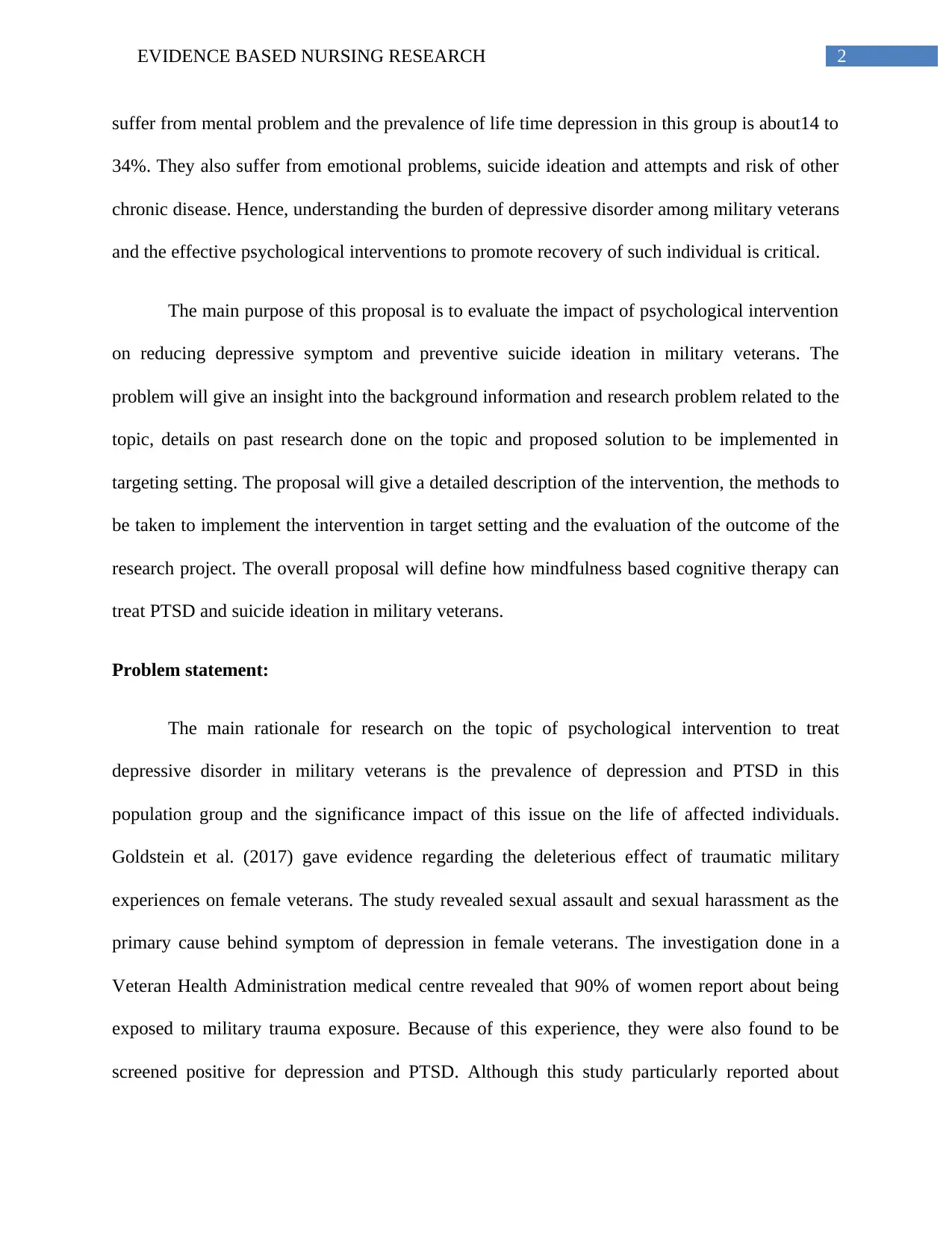
2EVIDENCE BASED NURSING RESEARCH
suffer from mental problem and the prevalence of life time depression in this group is about14 to
34%. They also suffer from emotional problems, suicide ideation and attempts and risk of other
chronic disease. Hence, understanding the burden of depressive disorder among military veterans
and the effective psychological interventions to promote recovery of such individual is critical.
The main purpose of this proposal is to evaluate the impact of psychological intervention
on reducing depressive symptom and preventive suicide ideation in military veterans. The
problem will give an insight into the background information and research problem related to the
topic, details on past research done on the topic and proposed solution to be implemented in
targeting setting. The proposal will give a detailed description of the intervention, the methods to
be taken to implement the intervention in target setting and the evaluation of the outcome of the
research project. The overall proposal will define how mindfulness based cognitive therapy can
treat PTSD and suicide ideation in military veterans.
Problem statement:
The main rationale for research on the topic of psychological intervention to treat
depressive disorder in military veterans is the prevalence of depression and PTSD in this
population group and the significance impact of this issue on the life of affected individuals.
Goldstein et al. (2017) gave evidence regarding the deleterious effect of traumatic military
experiences on female veterans. The study revealed sexual assault and sexual harassment as the
primary cause behind symptom of depression in female veterans. The investigation done in a
Veteran Health Administration medical centre revealed that 90% of women report about being
exposed to military trauma exposure. Because of this experience, they were also found to be
screened positive for depression and PTSD. Although this study particularly reported about
suffer from mental problem and the prevalence of life time depression in this group is about14 to
34%. They also suffer from emotional problems, suicide ideation and attempts and risk of other
chronic disease. Hence, understanding the burden of depressive disorder among military veterans
and the effective psychological interventions to promote recovery of such individual is critical.
The main purpose of this proposal is to evaluate the impact of psychological intervention
on reducing depressive symptom and preventive suicide ideation in military veterans. The
problem will give an insight into the background information and research problem related to the
topic, details on past research done on the topic and proposed solution to be implemented in
targeting setting. The proposal will give a detailed description of the intervention, the methods to
be taken to implement the intervention in target setting and the evaluation of the outcome of the
research project. The overall proposal will define how mindfulness based cognitive therapy can
treat PTSD and suicide ideation in military veterans.
Problem statement:
The main rationale for research on the topic of psychological intervention to treat
depressive disorder in military veterans is the prevalence of depression and PTSD in this
population group and the significance impact of this issue on the life of affected individuals.
Goldstein et al. (2017) gave evidence regarding the deleterious effect of traumatic military
experiences on female veterans. The study revealed sexual assault and sexual harassment as the
primary cause behind symptom of depression in female veterans. The investigation done in a
Veteran Health Administration medical centre revealed that 90% of women report about being
exposed to military trauma exposure. Because of this experience, they were also found to be
screened positive for depression and PTSD. Although this study particularly reported about
⊘ This is a preview!⊘
Do you want full access?
Subscribe today to unlock all pages.

Trusted by 1+ million students worldwide
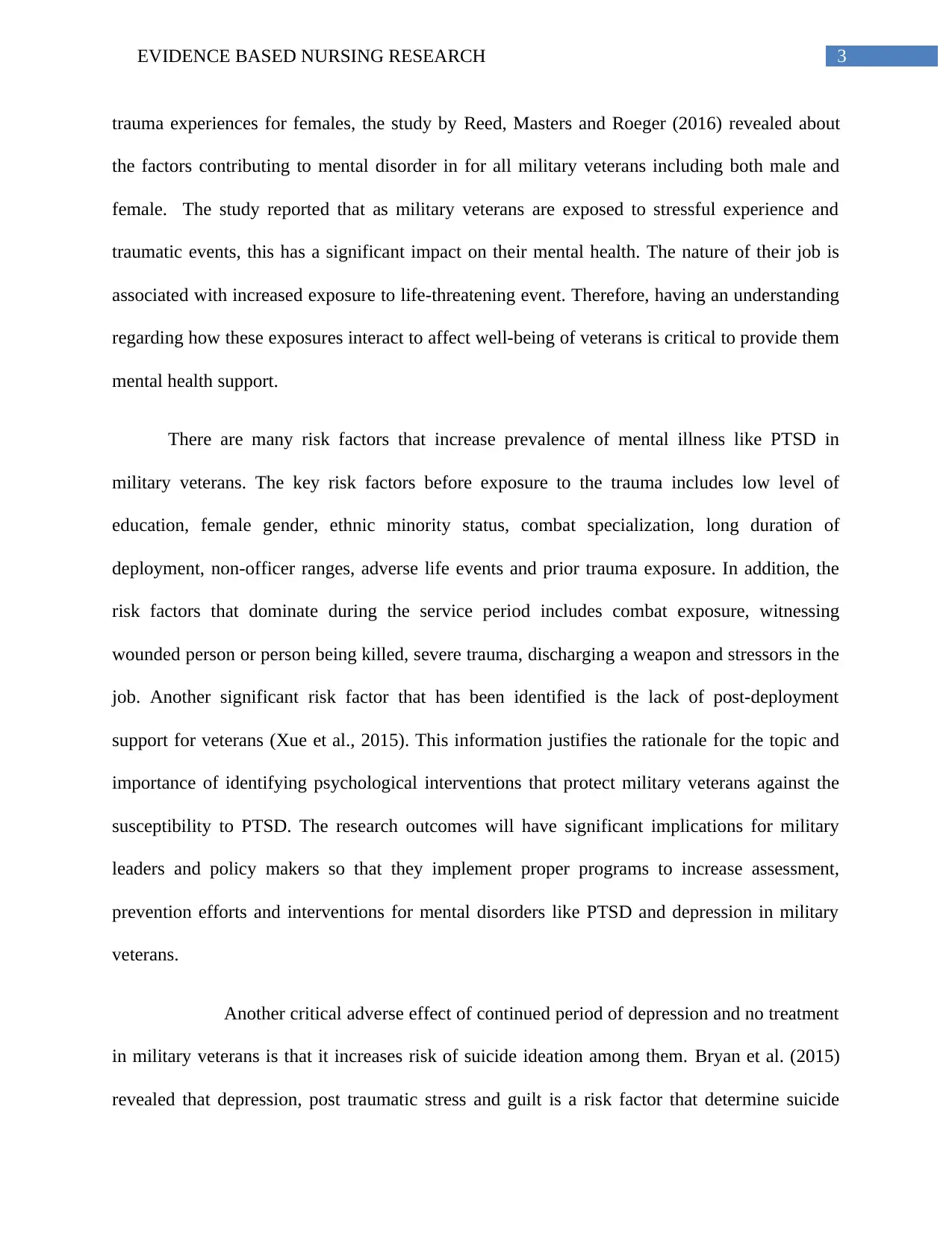
3EVIDENCE BASED NURSING RESEARCH
trauma experiences for females, the study by Reed, Masters and Roeger (2016) revealed about
the factors contributing to mental disorder in for all military veterans including both male and
female. The study reported that as military veterans are exposed to stressful experience and
traumatic events, this has a significant impact on their mental health. The nature of their job is
associated with increased exposure to life-threatening event. Therefore, having an understanding
regarding how these exposures interact to affect well-being of veterans is critical to provide them
mental health support.
There are many risk factors that increase prevalence of mental illness like PTSD in
military veterans. The key risk factors before exposure to the trauma includes low level of
education, female gender, ethnic minority status, combat specialization, long duration of
deployment, non-officer ranges, adverse life events and prior trauma exposure. In addition, the
risk factors that dominate during the service period includes combat exposure, witnessing
wounded person or person being killed, severe trauma, discharging a weapon and stressors in the
job. Another significant risk factor that has been identified is the lack of post-deployment
support for veterans (Xue et al., 2015). This information justifies the rationale for the topic and
importance of identifying psychological interventions that protect military veterans against the
susceptibility to PTSD. The research outcomes will have significant implications for military
leaders and policy makers so that they implement proper programs to increase assessment,
prevention efforts and interventions for mental disorders like PTSD and depression in military
veterans.
Another critical adverse effect of continued period of depression and no treatment
in military veterans is that it increases risk of suicide ideation among them. Bryan et al. (2015)
revealed that depression, post traumatic stress and guilt is a risk factor that determine suicide
trauma experiences for females, the study by Reed, Masters and Roeger (2016) revealed about
the factors contributing to mental disorder in for all military veterans including both male and
female. The study reported that as military veterans are exposed to stressful experience and
traumatic events, this has a significant impact on their mental health. The nature of their job is
associated with increased exposure to life-threatening event. Therefore, having an understanding
regarding how these exposures interact to affect well-being of veterans is critical to provide them
mental health support.
There are many risk factors that increase prevalence of mental illness like PTSD in
military veterans. The key risk factors before exposure to the trauma includes low level of
education, female gender, ethnic minority status, combat specialization, long duration of
deployment, non-officer ranges, adverse life events and prior trauma exposure. In addition, the
risk factors that dominate during the service period includes combat exposure, witnessing
wounded person or person being killed, severe trauma, discharging a weapon and stressors in the
job. Another significant risk factor that has been identified is the lack of post-deployment
support for veterans (Xue et al., 2015). This information justifies the rationale for the topic and
importance of identifying psychological interventions that protect military veterans against the
susceptibility to PTSD. The research outcomes will have significant implications for military
leaders and policy makers so that they implement proper programs to increase assessment,
prevention efforts and interventions for mental disorders like PTSD and depression in military
veterans.
Another critical adverse effect of continued period of depression and no treatment
in military veterans is that it increases risk of suicide ideation among them. Bryan et al. (2015)
revealed that depression, post traumatic stress and guilt is a risk factor that determine suicide
Paraphrase This Document
Need a fresh take? Get an instant paraphrase of this document with our AI Paraphraser
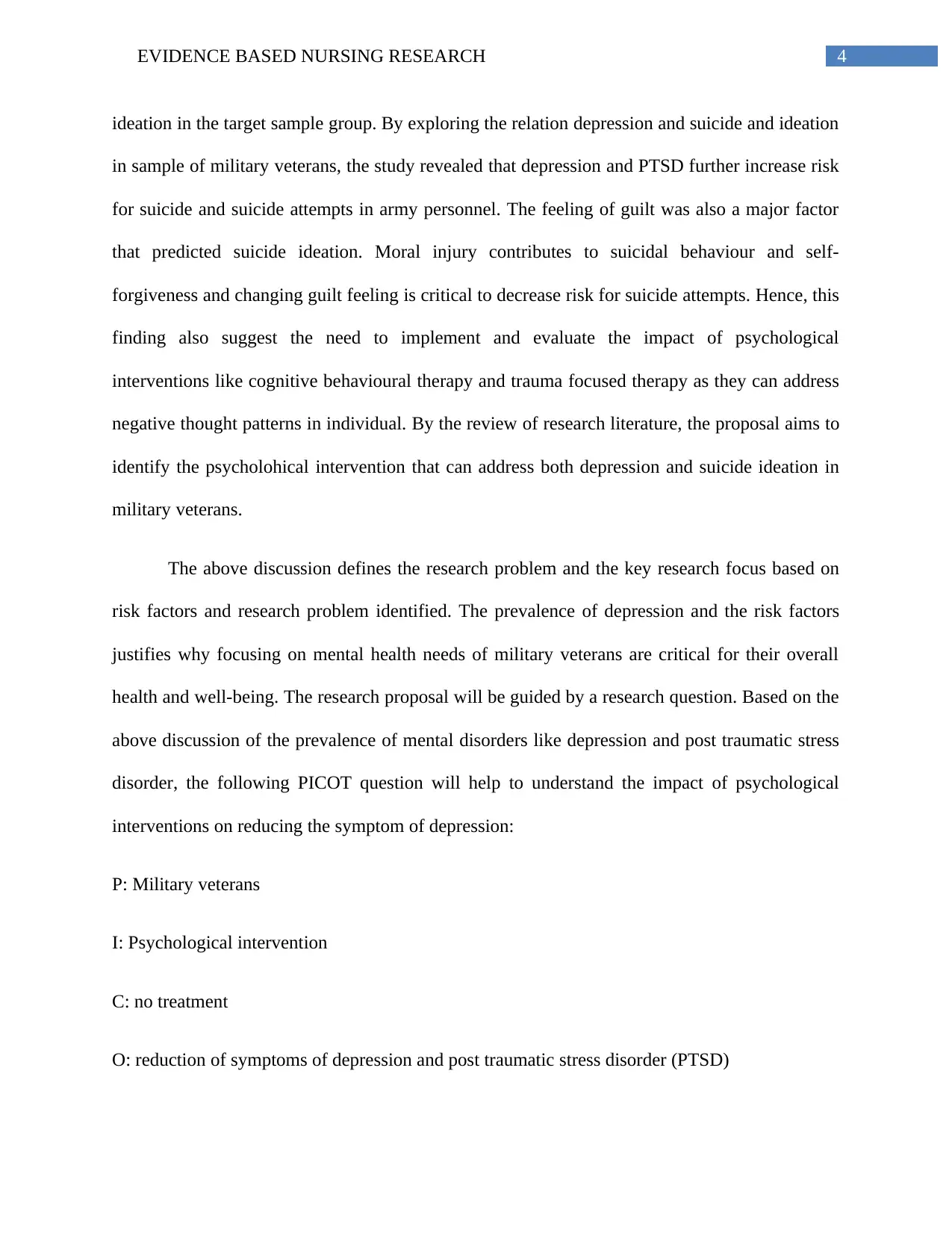
4EVIDENCE BASED NURSING RESEARCH
ideation in the target sample group. By exploring the relation depression and suicide and ideation
in sample of military veterans, the study revealed that depression and PTSD further increase risk
for suicide and suicide attempts in army personnel. The feeling of guilt was also a major factor
that predicted suicide ideation. Moral injury contributes to suicidal behaviour and self-
forgiveness and changing guilt feeling is critical to decrease risk for suicide attempts. Hence, this
finding also suggest the need to implement and evaluate the impact of psychological
interventions like cognitive behavioural therapy and trauma focused therapy as they can address
negative thought patterns in individual. By the review of research literature, the proposal aims to
identify the psycholohical intervention that can address both depression and suicide ideation in
military veterans.
The above discussion defines the research problem and the key research focus based on
risk factors and research problem identified. The prevalence of depression and the risk factors
justifies why focusing on mental health needs of military veterans are critical for their overall
health and well-being. The research proposal will be guided by a research question. Based on the
above discussion of the prevalence of mental disorders like depression and post traumatic stress
disorder, the following PICOT question will help to understand the impact of psychological
interventions on reducing the symptom of depression:
P: Military veterans
I: Psychological intervention
C: no treatment
O: reduction of symptoms of depression and post traumatic stress disorder (PTSD)
ideation in the target sample group. By exploring the relation depression and suicide and ideation
in sample of military veterans, the study revealed that depression and PTSD further increase risk
for suicide and suicide attempts in army personnel. The feeling of guilt was also a major factor
that predicted suicide ideation. Moral injury contributes to suicidal behaviour and self-
forgiveness and changing guilt feeling is critical to decrease risk for suicide attempts. Hence, this
finding also suggest the need to implement and evaluate the impact of psychological
interventions like cognitive behavioural therapy and trauma focused therapy as they can address
negative thought patterns in individual. By the review of research literature, the proposal aims to
identify the psycholohical intervention that can address both depression and suicide ideation in
military veterans.
The above discussion defines the research problem and the key research focus based on
risk factors and research problem identified. The prevalence of depression and the risk factors
justifies why focusing on mental health needs of military veterans are critical for their overall
health and well-being. The research proposal will be guided by a research question. Based on the
above discussion of the prevalence of mental disorders like depression and post traumatic stress
disorder, the following PICOT question will help to understand the impact of psychological
interventions on reducing the symptom of depression:
P: Military veterans
I: Psychological intervention
C: no treatment
O: reduction of symptoms of depression and post traumatic stress disorder (PTSD)
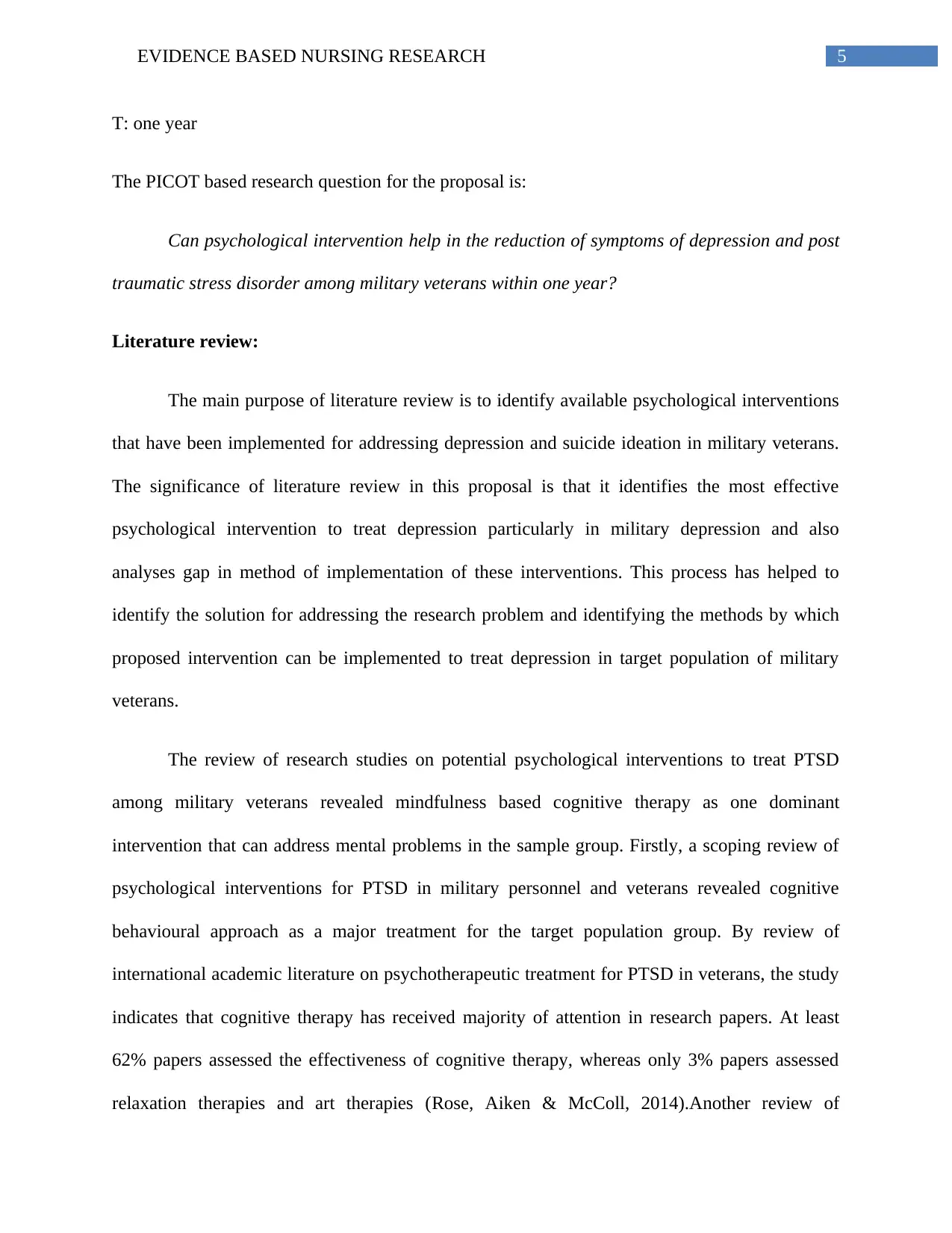
5EVIDENCE BASED NURSING RESEARCH
T: one year
The PICOT based research question for the proposal is:
Can psychological intervention help in the reduction of symptoms of depression and post
traumatic stress disorder among military veterans within one year?
Literature review:
The main purpose of literature review is to identify available psychological interventions
that have been implemented for addressing depression and suicide ideation in military veterans.
The significance of literature review in this proposal is that it identifies the most effective
psychological intervention to treat depression particularly in military depression and also
analyses gap in method of implementation of these interventions. This process has helped to
identify the solution for addressing the research problem and identifying the methods by which
proposed intervention can be implemented to treat depression in target population of military
veterans.
The review of research studies on potential psychological interventions to treat PTSD
among military veterans revealed mindfulness based cognitive therapy as one dominant
intervention that can address mental problems in the sample group. Firstly, a scoping review of
psychological interventions for PTSD in military personnel and veterans revealed cognitive
behavioural approach as a major treatment for the target population group. By review of
international academic literature on psychotherapeutic treatment for PTSD in veterans, the study
indicates that cognitive therapy has received majority of attention in research papers. At least
62% papers assessed the effectiveness of cognitive therapy, whereas only 3% papers assessed
relaxation therapies and art therapies (Rose, Aiken & McColl, 2014).Another review of
T: one year
The PICOT based research question for the proposal is:
Can psychological intervention help in the reduction of symptoms of depression and post
traumatic stress disorder among military veterans within one year?
Literature review:
The main purpose of literature review is to identify available psychological interventions
that have been implemented for addressing depression and suicide ideation in military veterans.
The significance of literature review in this proposal is that it identifies the most effective
psychological intervention to treat depression particularly in military depression and also
analyses gap in method of implementation of these interventions. This process has helped to
identify the solution for addressing the research problem and identifying the methods by which
proposed intervention can be implemented to treat depression in target population of military
veterans.
The review of research studies on potential psychological interventions to treat PTSD
among military veterans revealed mindfulness based cognitive therapy as one dominant
intervention that can address mental problems in the sample group. Firstly, a scoping review of
psychological interventions for PTSD in military personnel and veterans revealed cognitive
behavioural approach as a major treatment for the target population group. By review of
international academic literature on psychotherapeutic treatment for PTSD in veterans, the study
indicates that cognitive therapy has received majority of attention in research papers. At least
62% papers assessed the effectiveness of cognitive therapy, whereas only 3% papers assessed
relaxation therapies and art therapies (Rose, Aiken & McColl, 2014).Another review of
⊘ This is a preview!⊘
Do you want full access?
Subscribe today to unlock all pages.

Trusted by 1+ million students worldwide
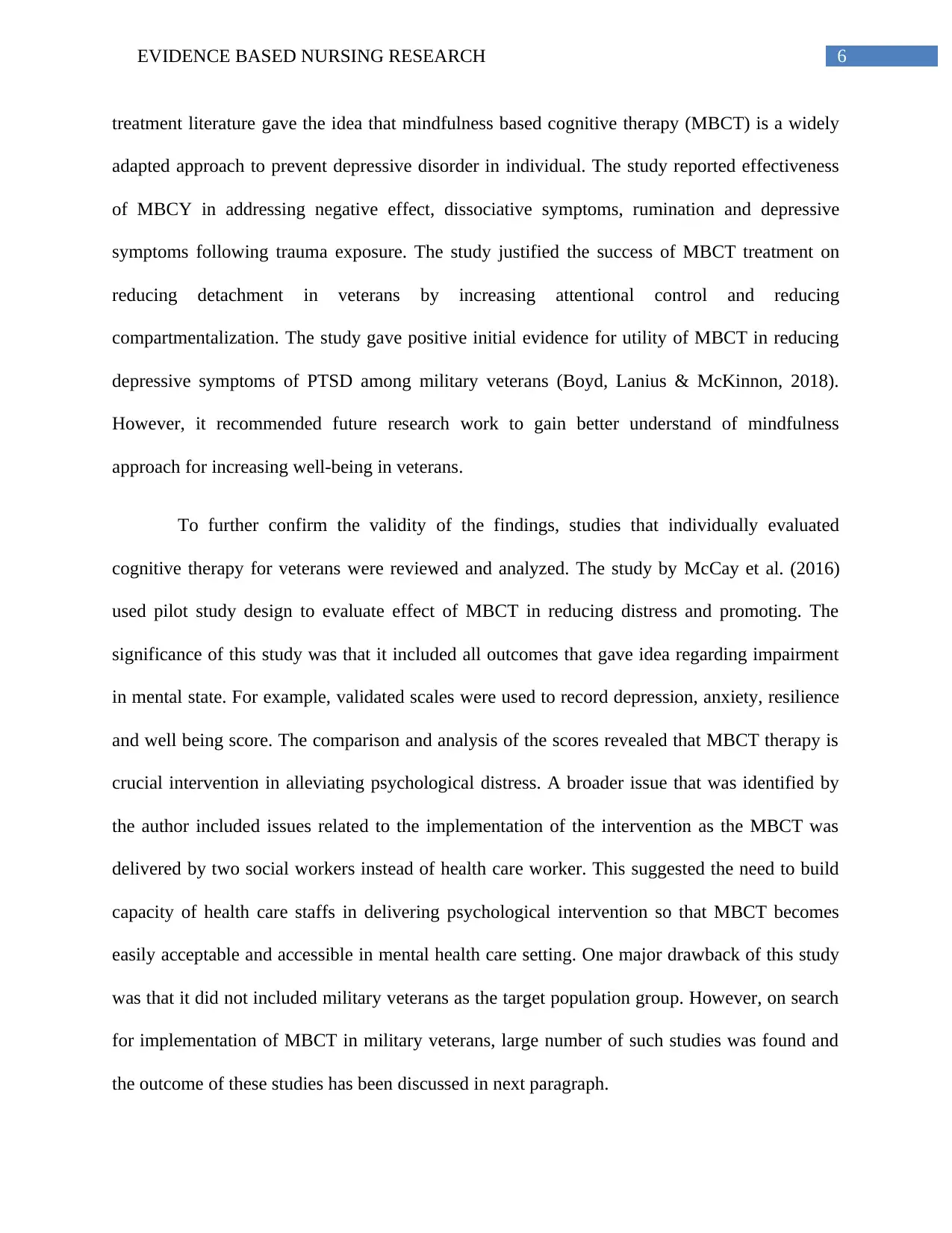
6EVIDENCE BASED NURSING RESEARCH
treatment literature gave the idea that mindfulness based cognitive therapy (MBCT) is a widely
adapted approach to prevent depressive disorder in individual. The study reported effectiveness
of MBCY in addressing negative effect, dissociative symptoms, rumination and depressive
symptoms following trauma exposure. The study justified the success of MBCT treatment on
reducing detachment in veterans by increasing attentional control and reducing
compartmentalization. The study gave positive initial evidence for utility of MBCT in reducing
depressive symptoms of PTSD among military veterans (Boyd, Lanius & McKinnon, 2018).
However, it recommended future research work to gain better understand of mindfulness
approach for increasing well-being in veterans.
To further confirm the validity of the findings, studies that individually evaluated
cognitive therapy for veterans were reviewed and analyzed. The study by McCay et al. (2016)
used pilot study design to evaluate effect of MBCT in reducing distress and promoting. The
significance of this study was that it included all outcomes that gave idea regarding impairment
in mental state. For example, validated scales were used to record depression, anxiety, resilience
and well being score. The comparison and analysis of the scores revealed that MBCT therapy is
crucial intervention in alleviating psychological distress. A broader issue that was identified by
the author included issues related to the implementation of the intervention as the MBCT was
delivered by two social workers instead of health care worker. This suggested the need to build
capacity of health care staffs in delivering psychological intervention so that MBCT becomes
easily acceptable and accessible in mental health care setting. One major drawback of this study
was that it did not included military veterans as the target population group. However, on search
for implementation of MBCT in military veterans, large number of such studies was found and
the outcome of these studies has been discussed in next paragraph.
treatment literature gave the idea that mindfulness based cognitive therapy (MBCT) is a widely
adapted approach to prevent depressive disorder in individual. The study reported effectiveness
of MBCY in addressing negative effect, dissociative symptoms, rumination and depressive
symptoms following trauma exposure. The study justified the success of MBCT treatment on
reducing detachment in veterans by increasing attentional control and reducing
compartmentalization. The study gave positive initial evidence for utility of MBCT in reducing
depressive symptoms of PTSD among military veterans (Boyd, Lanius & McKinnon, 2018).
However, it recommended future research work to gain better understand of mindfulness
approach for increasing well-being in veterans.
To further confirm the validity of the findings, studies that individually evaluated
cognitive therapy for veterans were reviewed and analyzed. The study by McCay et al. (2016)
used pilot study design to evaluate effect of MBCT in reducing distress and promoting. The
significance of this study was that it included all outcomes that gave idea regarding impairment
in mental state. For example, validated scales were used to record depression, anxiety, resilience
and well being score. The comparison and analysis of the scores revealed that MBCT therapy is
crucial intervention in alleviating psychological distress. A broader issue that was identified by
the author included issues related to the implementation of the intervention as the MBCT was
delivered by two social workers instead of health care worker. This suggested the need to build
capacity of health care staffs in delivering psychological intervention so that MBCT becomes
easily acceptable and accessible in mental health care setting. One major drawback of this study
was that it did not included military veterans as the target population group. However, on search
for implementation of MBCT in military veterans, large number of such studies was found and
the outcome of these studies has been discussed in next paragraph.
Paraphrase This Document
Need a fresh take? Get an instant paraphrase of this document with our AI Paraphraser
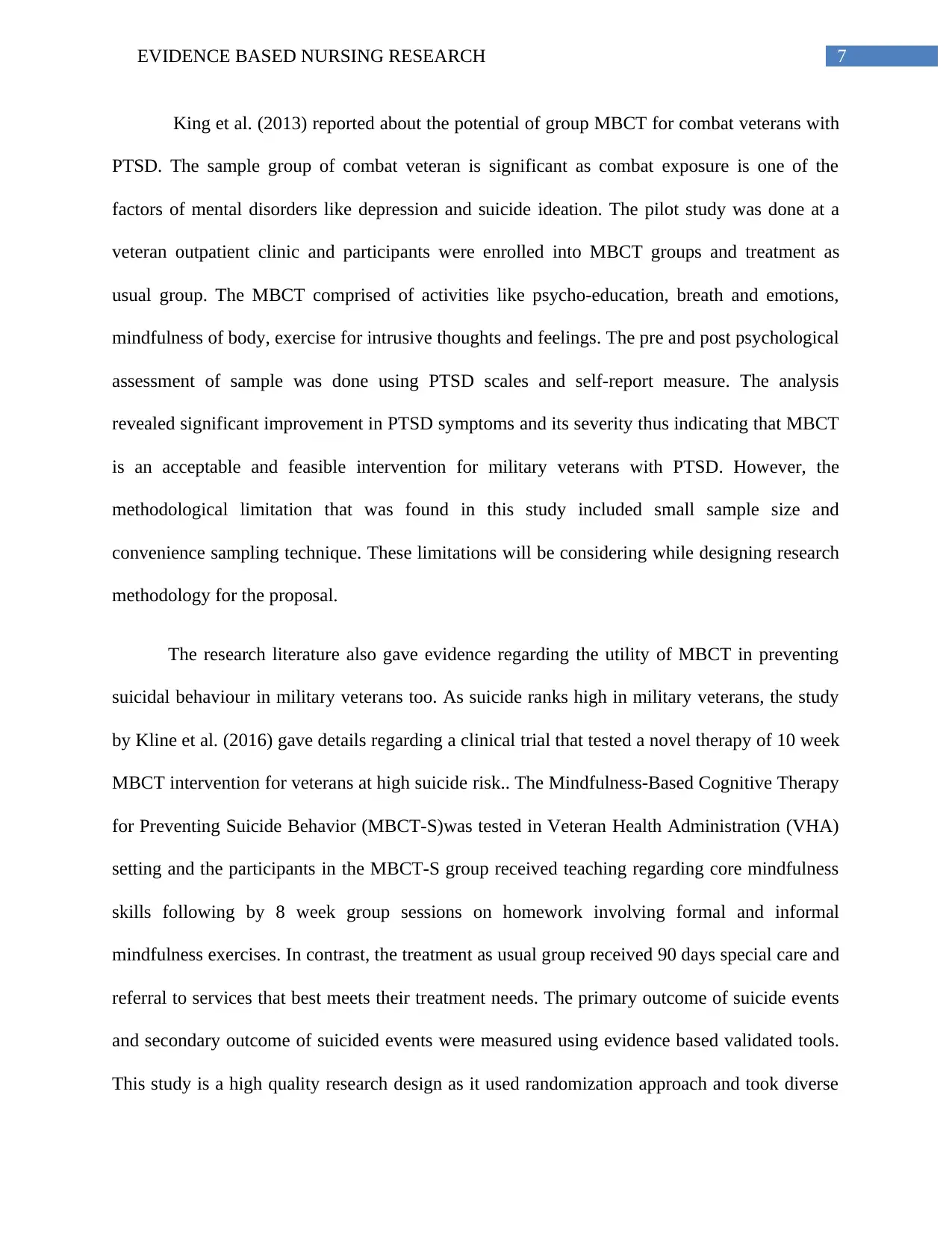
7EVIDENCE BASED NURSING RESEARCH
King et al. (2013) reported about the potential of group MBCT for combat veterans with
PTSD. The sample group of combat veteran is significant as combat exposure is one of the
factors of mental disorders like depression and suicide ideation. The pilot study was done at a
veteran outpatient clinic and participants were enrolled into MBCT groups and treatment as
usual group. The MBCT comprised of activities like psycho-education, breath and emotions,
mindfulness of body, exercise for intrusive thoughts and feelings. The pre and post psychological
assessment of sample was done using PTSD scales and self-report measure. The analysis
revealed significant improvement in PTSD symptoms and its severity thus indicating that MBCT
is an acceptable and feasible intervention for military veterans with PTSD. However, the
methodological limitation that was found in this study included small sample size and
convenience sampling technique. These limitations will be considering while designing research
methodology for the proposal.
The research literature also gave evidence regarding the utility of MBCT in preventing
suicidal behaviour in military veterans too. As suicide ranks high in military veterans, the study
by Kline et al. (2016) gave details regarding a clinical trial that tested a novel therapy of 10 week
MBCT intervention for veterans at high suicide risk.. The Mindfulness-Based Cognitive Therapy
for Preventing Suicide Behavior (MBCT-S)was tested in Veteran Health Administration (VHA)
setting and the participants in the MBCT-S group received teaching regarding core mindfulness
skills following by 8 week group sessions on homework involving formal and informal
mindfulness exercises. In contrast, the treatment as usual group received 90 days special care and
referral to services that best meets their treatment needs. The primary outcome of suicide events
and secondary outcome of suicided events were measured using evidence based validated tools.
This study is a high quality research design as it used randomization approach and took diverse
King et al. (2013) reported about the potential of group MBCT for combat veterans with
PTSD. The sample group of combat veteran is significant as combat exposure is one of the
factors of mental disorders like depression and suicide ideation. The pilot study was done at a
veteran outpatient clinic and participants were enrolled into MBCT groups and treatment as
usual group. The MBCT comprised of activities like psycho-education, breath and emotions,
mindfulness of body, exercise for intrusive thoughts and feelings. The pre and post psychological
assessment of sample was done using PTSD scales and self-report measure. The analysis
revealed significant improvement in PTSD symptoms and its severity thus indicating that MBCT
is an acceptable and feasible intervention for military veterans with PTSD. However, the
methodological limitation that was found in this study included small sample size and
convenience sampling technique. These limitations will be considering while designing research
methodology for the proposal.
The research literature also gave evidence regarding the utility of MBCT in preventing
suicidal behaviour in military veterans too. As suicide ranks high in military veterans, the study
by Kline et al. (2016) gave details regarding a clinical trial that tested a novel therapy of 10 week
MBCT intervention for veterans at high suicide risk.. The Mindfulness-Based Cognitive Therapy
for Preventing Suicide Behavior (MBCT-S)was tested in Veteran Health Administration (VHA)
setting and the participants in the MBCT-S group received teaching regarding core mindfulness
skills following by 8 week group sessions on homework involving formal and informal
mindfulness exercises. In contrast, the treatment as usual group received 90 days special care and
referral to services that best meets their treatment needs. The primary outcome of suicide events
and secondary outcome of suicided events were measured using evidence based validated tools.
This study is a high quality research design as it used randomization approach and took diverse
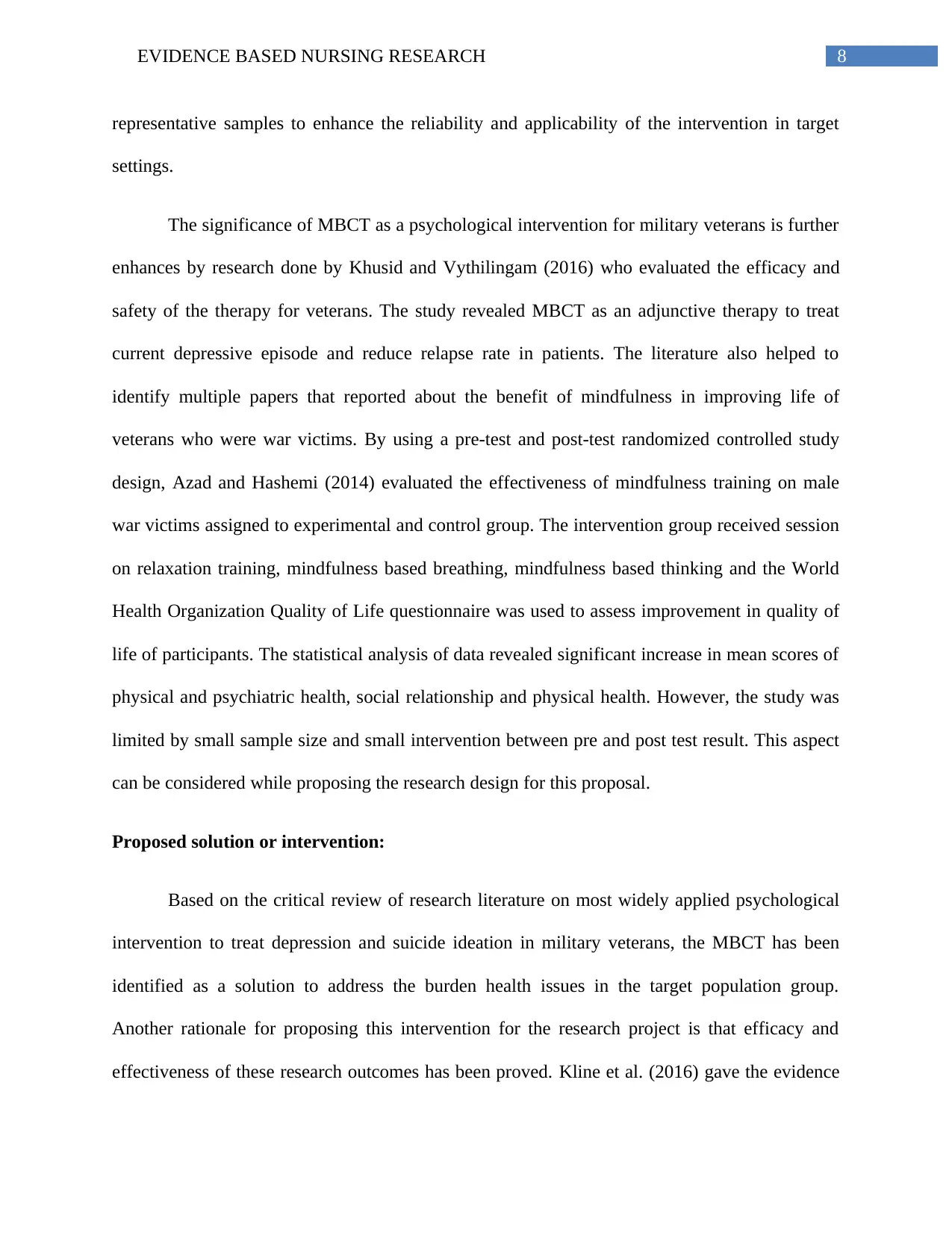
8EVIDENCE BASED NURSING RESEARCH
representative samples to enhance the reliability and applicability of the intervention in target
settings.
The significance of MBCT as a psychological intervention for military veterans is further
enhances by research done by Khusid and Vythilingam (2016) who evaluated the efficacy and
safety of the therapy for veterans. The study revealed MBCT as an adjunctive therapy to treat
current depressive episode and reduce relapse rate in patients. The literature also helped to
identify multiple papers that reported about the benefit of mindfulness in improving life of
veterans who were war victims. By using a pre-test and post-test randomized controlled study
design, Azad and Hashemi (2014) evaluated the effectiveness of mindfulness training on male
war victims assigned to experimental and control group. The intervention group received session
on relaxation training, mindfulness based breathing, mindfulness based thinking and the World
Health Organization Quality of Life questionnaire was used to assess improvement in quality of
life of participants. The statistical analysis of data revealed significant increase in mean scores of
physical and psychiatric health, social relationship and physical health. However, the study was
limited by small sample size and small intervention between pre and post test result. This aspect
can be considered while proposing the research design for this proposal.
Proposed solution or intervention:
Based on the critical review of research literature on most widely applied psychological
intervention to treat depression and suicide ideation in military veterans, the MBCT has been
identified as a solution to address the burden health issues in the target population group.
Another rationale for proposing this intervention for the research project is that efficacy and
effectiveness of these research outcomes has been proved. Kline et al. (2016) gave the evidence
representative samples to enhance the reliability and applicability of the intervention in target
settings.
The significance of MBCT as a psychological intervention for military veterans is further
enhances by research done by Khusid and Vythilingam (2016) who evaluated the efficacy and
safety of the therapy for veterans. The study revealed MBCT as an adjunctive therapy to treat
current depressive episode and reduce relapse rate in patients. The literature also helped to
identify multiple papers that reported about the benefit of mindfulness in improving life of
veterans who were war victims. By using a pre-test and post-test randomized controlled study
design, Azad and Hashemi (2014) evaluated the effectiveness of mindfulness training on male
war victims assigned to experimental and control group. The intervention group received session
on relaxation training, mindfulness based breathing, mindfulness based thinking and the World
Health Organization Quality of Life questionnaire was used to assess improvement in quality of
life of participants. The statistical analysis of data revealed significant increase in mean scores of
physical and psychiatric health, social relationship and physical health. However, the study was
limited by small sample size and small intervention between pre and post test result. This aspect
can be considered while proposing the research design for this proposal.
Proposed solution or intervention:
Based on the critical review of research literature on most widely applied psychological
intervention to treat depression and suicide ideation in military veterans, the MBCT has been
identified as a solution to address the burden health issues in the target population group.
Another rationale for proposing this intervention for the research project is that efficacy and
effectiveness of these research outcomes has been proved. Kline et al. (2016) gave the evidence
⊘ This is a preview!⊘
Do you want full access?
Subscribe today to unlock all pages.

Trusted by 1+ million students worldwide
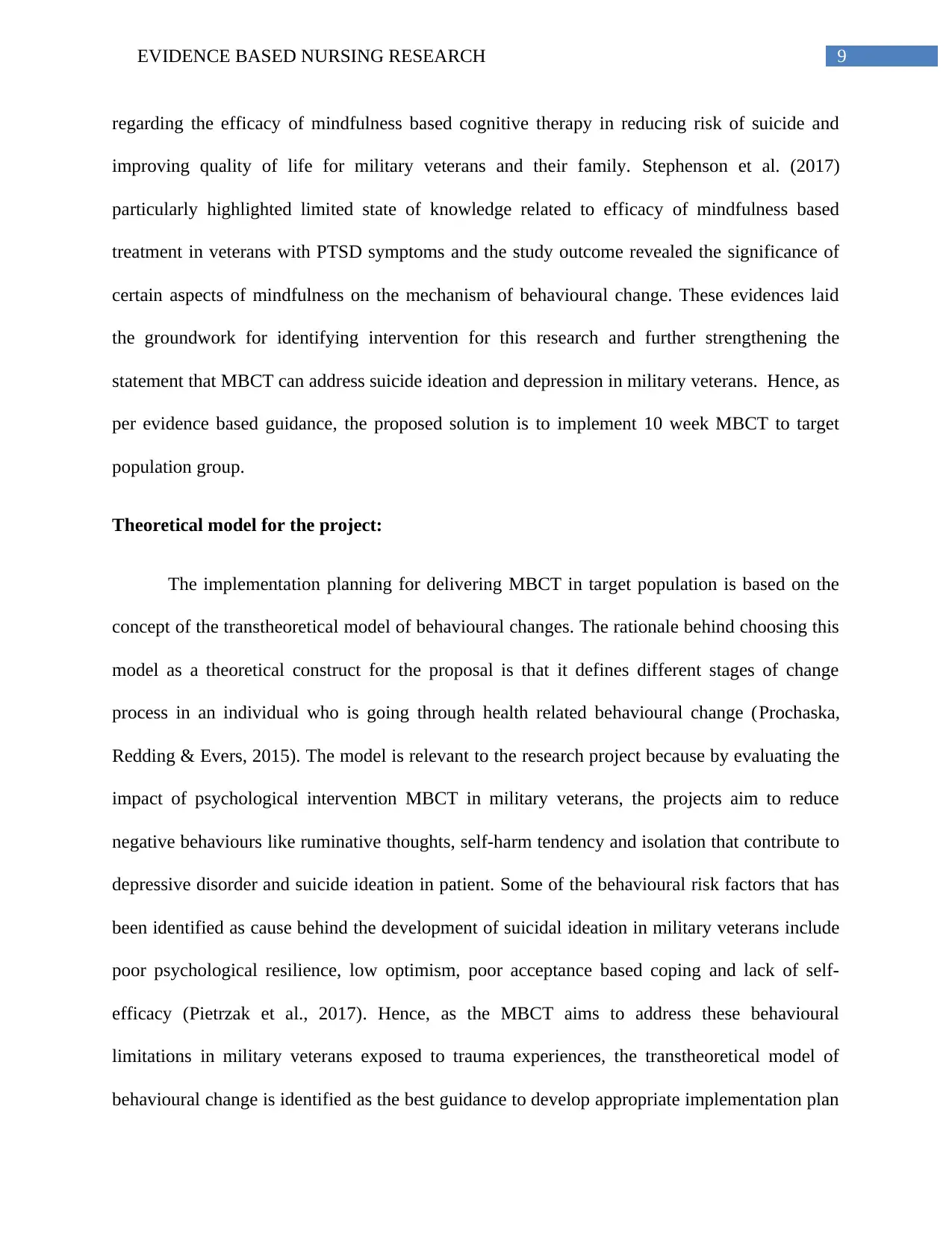
9EVIDENCE BASED NURSING RESEARCH
regarding the efficacy of mindfulness based cognitive therapy in reducing risk of suicide and
improving quality of life for military veterans and their family. Stephenson et al. (2017)
particularly highlighted limited state of knowledge related to efficacy of mindfulness based
treatment in veterans with PTSD symptoms and the study outcome revealed the significance of
certain aspects of mindfulness on the mechanism of behavioural change. These evidences laid
the groundwork for identifying intervention for this research and further strengthening the
statement that MBCT can address suicide ideation and depression in military veterans. Hence, as
per evidence based guidance, the proposed solution is to implement 10 week MBCT to target
population group.
Theoretical model for the project:
The implementation planning for delivering MBCT in target population is based on the
concept of the transtheoretical model of behavioural changes. The rationale behind choosing this
model as a theoretical construct for the proposal is that it defines different stages of change
process in an individual who is going through health related behavioural change (Prochaska,
Redding & Evers, 2015). The model is relevant to the research project because by evaluating the
impact of psychological intervention MBCT in military veterans, the projects aim to reduce
negative behaviours like ruminative thoughts, self-harm tendency and isolation that contribute to
depressive disorder and suicide ideation in patient. Some of the behavioural risk factors that has
been identified as cause behind the development of suicidal ideation in military veterans include
poor psychological resilience, low optimism, poor acceptance based coping and lack of self-
efficacy (Pietrzak et al., 2017). Hence, as the MBCT aims to address these behavioural
limitations in military veterans exposed to trauma experiences, the transtheoretical model of
behavioural change is identified as the best guidance to develop appropriate implementation plan
regarding the efficacy of mindfulness based cognitive therapy in reducing risk of suicide and
improving quality of life for military veterans and their family. Stephenson et al. (2017)
particularly highlighted limited state of knowledge related to efficacy of mindfulness based
treatment in veterans with PTSD symptoms and the study outcome revealed the significance of
certain aspects of mindfulness on the mechanism of behavioural change. These evidences laid
the groundwork for identifying intervention for this research and further strengthening the
statement that MBCT can address suicide ideation and depression in military veterans. Hence, as
per evidence based guidance, the proposed solution is to implement 10 week MBCT to target
population group.
Theoretical model for the project:
The implementation planning for delivering MBCT in target population is based on the
concept of the transtheoretical model of behavioural changes. The rationale behind choosing this
model as a theoretical construct for the proposal is that it defines different stages of change
process in an individual who is going through health related behavioural change (Prochaska,
Redding & Evers, 2015). The model is relevant to the research project because by evaluating the
impact of psychological intervention MBCT in military veterans, the projects aim to reduce
negative behaviours like ruminative thoughts, self-harm tendency and isolation that contribute to
depressive disorder and suicide ideation in patient. Some of the behavioural risk factors that has
been identified as cause behind the development of suicidal ideation in military veterans include
poor psychological resilience, low optimism, poor acceptance based coping and lack of self-
efficacy (Pietrzak et al., 2017). Hence, as the MBCT aims to address these behavioural
limitations in military veterans exposed to trauma experiences, the transtheoretical model of
behavioural change is identified as the best guidance to develop appropriate implementation plan
Paraphrase This Document
Need a fresh take? Get an instant paraphrase of this document with our AI Paraphraser
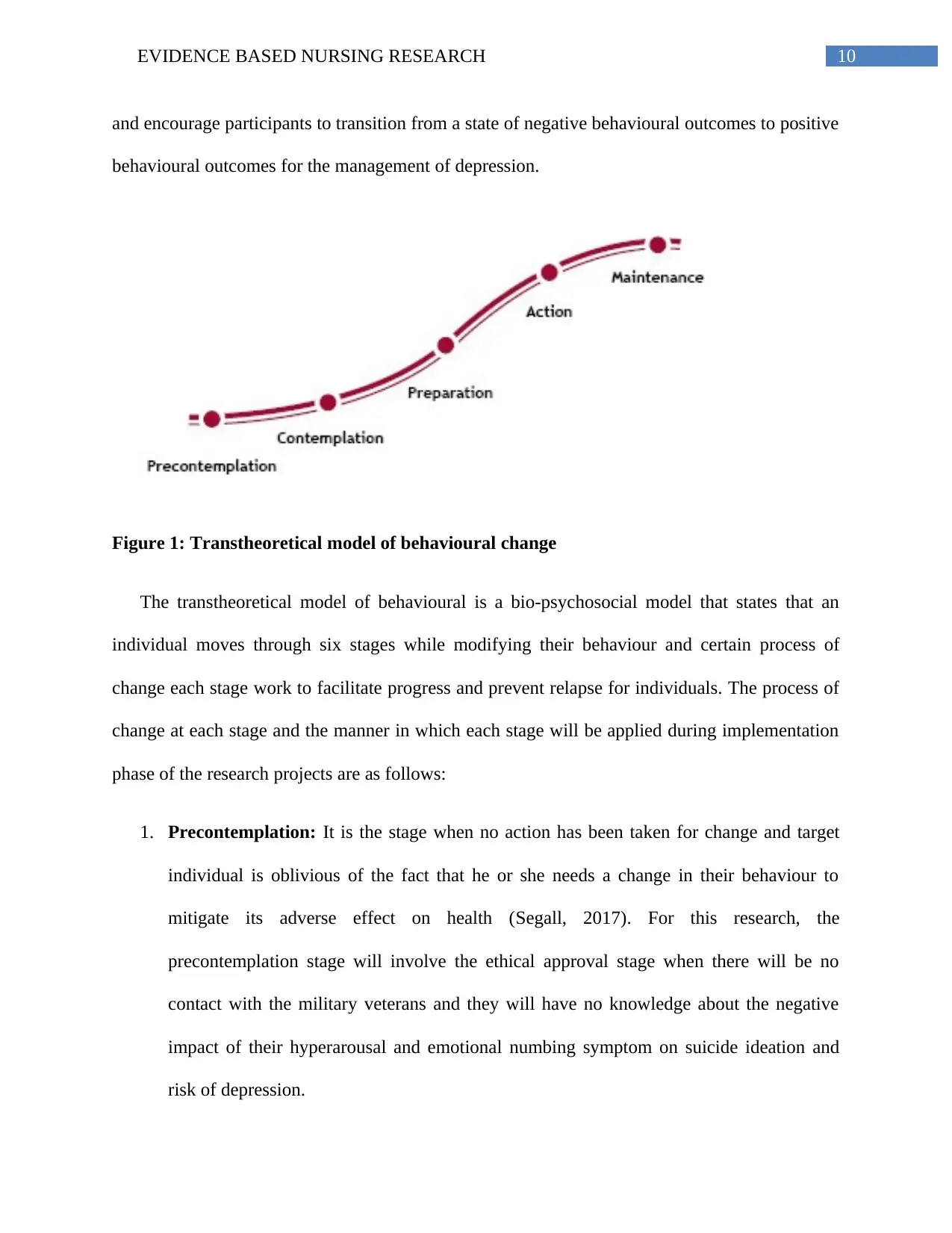
10EVIDENCE BASED NURSING RESEARCH
and encourage participants to transition from a state of negative behavioural outcomes to positive
behavioural outcomes for the management of depression.
Figure 1: Transtheoretical model of behavioural change
The transtheoretical model of behavioural is a bio-psychosocial model that states that an
individual moves through six stages while modifying their behaviour and certain process of
change each stage work to facilitate progress and prevent relapse for individuals. The process of
change at each stage and the manner in which each stage will be applied during implementation
phase of the research projects are as follows:
1. Precontemplation: It is the stage when no action has been taken for change and target
individual is oblivious of the fact that he or she needs a change in their behaviour to
mitigate its adverse effect on health (Segall, 2017). For this research, the
precontemplation stage will involve the ethical approval stage when there will be no
contact with the military veterans and they will have no knowledge about the negative
impact of their hyperarousal and emotional numbing symptom on suicide ideation and
risk of depression.
and encourage participants to transition from a state of negative behavioural outcomes to positive
behavioural outcomes for the management of depression.
Figure 1: Transtheoretical model of behavioural change
The transtheoretical model of behavioural is a bio-psychosocial model that states that an
individual moves through six stages while modifying their behaviour and certain process of
change each stage work to facilitate progress and prevent relapse for individuals. The process of
change at each stage and the manner in which each stage will be applied during implementation
phase of the research projects are as follows:
1. Precontemplation: It is the stage when no action has been taken for change and target
individual is oblivious of the fact that he or she needs a change in their behaviour to
mitigate its adverse effect on health (Segall, 2017). For this research, the
precontemplation stage will involve the ethical approval stage when there will be no
contact with the military veterans and they will have no knowledge about the negative
impact of their hyperarousal and emotional numbing symptom on suicide ideation and
risk of depression.
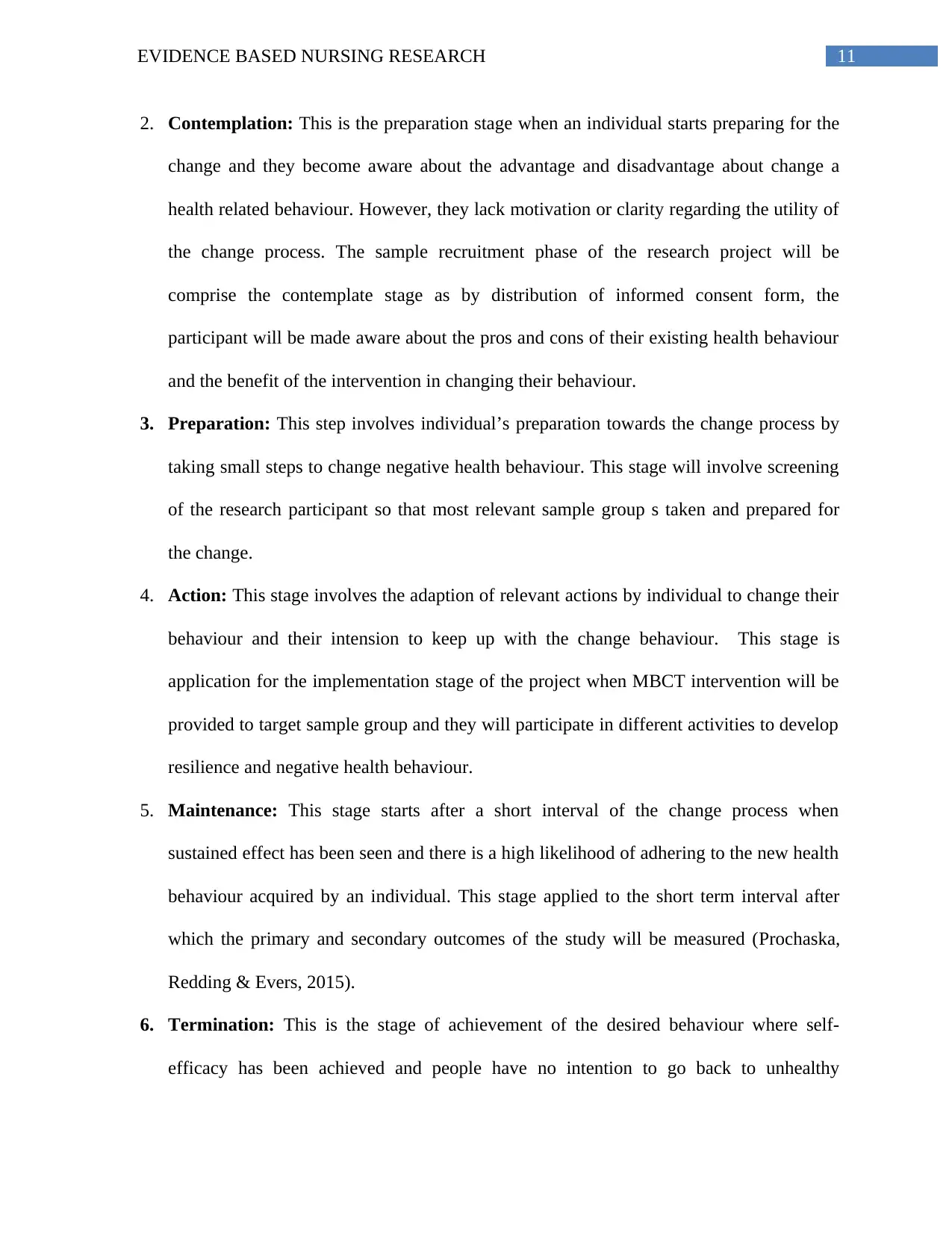
11EVIDENCE BASED NURSING RESEARCH
2. Contemplation: This is the preparation stage when an individual starts preparing for the
change and they become aware about the advantage and disadvantage about change a
health related behaviour. However, they lack motivation or clarity regarding the utility of
the change process. The sample recruitment phase of the research project will be
comprise the contemplate stage as by distribution of informed consent form, the
participant will be made aware about the pros and cons of their existing health behaviour
and the benefit of the intervention in changing their behaviour.
3. Preparation: This step involves individual’s preparation towards the change process by
taking small steps to change negative health behaviour. This stage will involve screening
of the research participant so that most relevant sample group s taken and prepared for
the change.
4. Action: This stage involves the adaption of relevant actions by individual to change their
behaviour and their intension to keep up with the change behaviour. This stage is
application for the implementation stage of the project when MBCT intervention will be
provided to target sample group and they will participate in different activities to develop
resilience and negative health behaviour.
5. Maintenance: This stage starts after a short interval of the change process when
sustained effect has been seen and there is a high likelihood of adhering to the new health
behaviour acquired by an individual. This stage applied to the short term interval after
which the primary and secondary outcomes of the study will be measured (Prochaska,
Redding & Evers, 2015).
6. Termination: This is the stage of achievement of the desired behaviour where self-
efficacy has been achieved and people have no intention to go back to unhealthy
2. Contemplation: This is the preparation stage when an individual starts preparing for the
change and they become aware about the advantage and disadvantage about change a
health related behaviour. However, they lack motivation or clarity regarding the utility of
the change process. The sample recruitment phase of the research project will be
comprise the contemplate stage as by distribution of informed consent form, the
participant will be made aware about the pros and cons of their existing health behaviour
and the benefit of the intervention in changing their behaviour.
3. Preparation: This step involves individual’s preparation towards the change process by
taking small steps to change negative health behaviour. This stage will involve screening
of the research participant so that most relevant sample group s taken and prepared for
the change.
4. Action: This stage involves the adaption of relevant actions by individual to change their
behaviour and their intension to keep up with the change behaviour. This stage is
application for the implementation stage of the project when MBCT intervention will be
provided to target sample group and they will participate in different activities to develop
resilience and negative health behaviour.
5. Maintenance: This stage starts after a short interval of the change process when
sustained effect has been seen and there is a high likelihood of adhering to the new health
behaviour acquired by an individual. This stage applied to the short term interval after
which the primary and secondary outcomes of the study will be measured (Prochaska,
Redding & Evers, 2015).
6. Termination: This is the stage of achievement of the desired behaviour where self-
efficacy has been achieved and people have no intention to go back to unhealthy
⊘ This is a preview!⊘
Do you want full access?
Subscribe today to unlock all pages.

Trusted by 1+ million students worldwide
1 out of 26
Related Documents
Your All-in-One AI-Powered Toolkit for Academic Success.
+13062052269
info@desklib.com
Available 24*7 on WhatsApp / Email
![[object Object]](/_next/static/media/star-bottom.7253800d.svg)
Unlock your academic potential
Copyright © 2020–2026 A2Z Services. All Rights Reserved. Developed and managed by ZUCOL.





